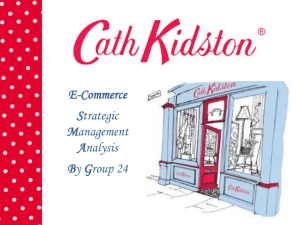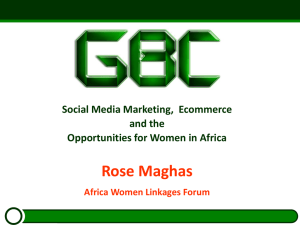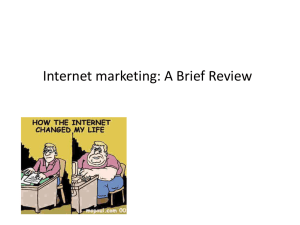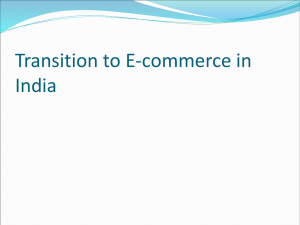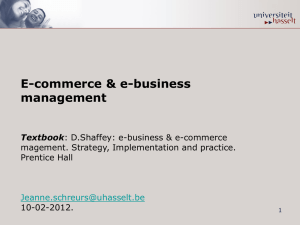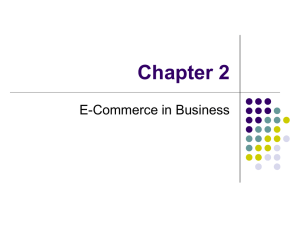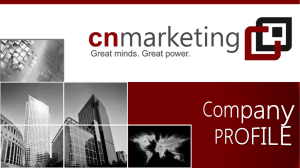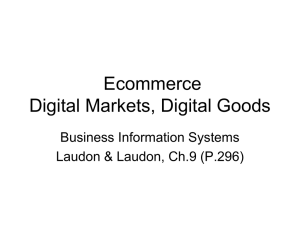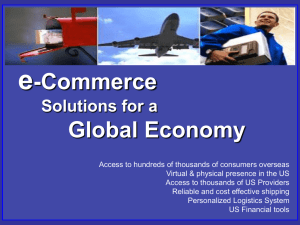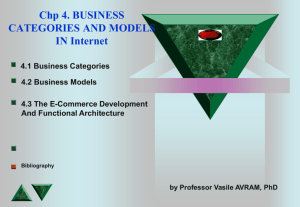Chapter 12 E
advertisement
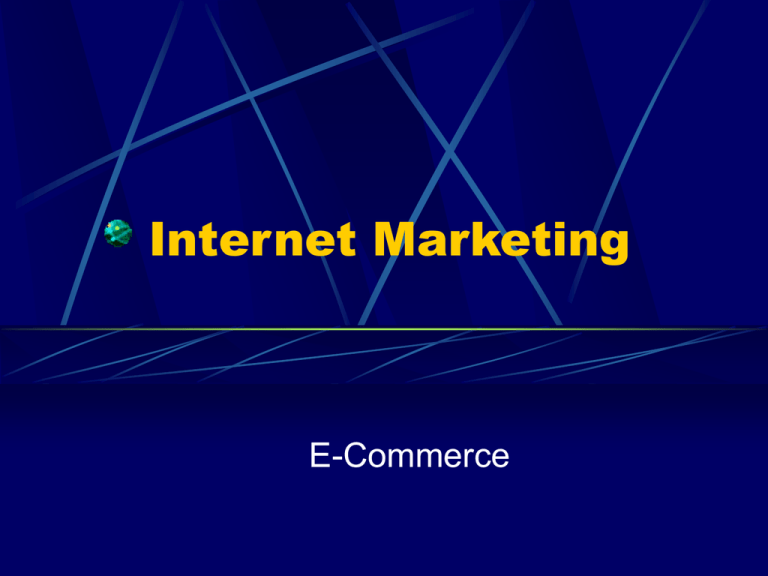
Internet Marketing E-Commerce E-Commerce & Web Sites Raises site performance More online performance, e.g., email Web-server performance is critical – look for bottlenecks Increases personalization Biggest in B2B – seen as convenient, cost saving and good service Consumers fear privacy and reselling of data Personalization based on perceived lifetime value Personalization/e-commerce virtuous circle Expands Site Scope Customer acquisition costs E*Trade 1996-7 $50 per customer and in 1998 $275 per customer 70% of first year revs on marketing, 30% in year two Results of high acquisition costs Searches for methods Premium on customer loyalty building Desire to expand a customer’s online business Take a Dip – The Profit Pool Goal – take advantage of customer traffic Products and services that fit with current customer purchases – Amazon? Profitable items Alliance Partners Judge by The Profit Pool ID different products and calculate their revenue and profit share Profit Pool Segments Anchor services Service providers at core of an ecommerce site Extension services Valuable partners with an anchor service Neutral services Components without high profits or customer contact frequency Online Selling Redraws connections between buyers and sellers Complementary purchases Consistent positioning Complicates the split of profits between pool members Worries about losing access to customers and high referral fees E-Commerce Buying Unique information source To succeed as a retail tool Price – monetary and non-monetary costs kept lower than traditional alternatives Assortment – match buyer desires Convenience – superior timing, location and buying process Entertainment – more fun than traditional Monetary Cost Full online price = [Online price * (1 + tax rate)] + shipping cost + shopping/purchasing costs +extra cost if returns required Regular Price + Tax Lower regular prices Book industry Amazon vs. Wal-Mart Dangers of this strategy? Offer lower prices on all items Exchange rate Taxes Tough to avoid GST – How could you do it? Most avoid PST by not having a physical presence Consumers in high tax provinces shift behaviour Dangers? Shipping Cost Categories of goods Digital information goods – near 0 Digital entertainment – transmission and data storage costs Hard goods – weight, speed of delivery Perishables – high Costs affect consumer decisions Problems of shipping to home addresses FedEx vs. UPS – Who will win? Assortment and Convenience Problems with traditional stores Limited assortment, hours and advice Physical vs. virtual inventory Easier for e-commerce firms to add SKU’s Centralized inventory management Tap into repeat purchases – B2B One-stop shopping – Chemdex Comparison shopping – software and agents Entertainment Less developed due to available technology Adult entertainment leads the way Distribution One distribution system or two? Channel conflict Goal divergence Responsibility disputes Objectives of manufacturer and channel partners differ Customer handling, territories, functions, technology Differing perceptions of reality Control of key customers Exclusive distribution through corp. site or contractual agreement Proper Distribution Disintermediation Dropping layers of distribution channel Reintermediating Adding levels, e.g. auto-locating services Reorganization Better product Learning about customer wants and needs Efficient system of customer contacts Quick and cheap market assess Channel Benefits Build-to-Order Dell’s success Real-time marketing “Personally customized goods or services continuously update themselves to continuously track changing customer needs, without intervention by corporate personnel, often without conscious or overt input from the customer.” Internet Benefits Link between customer and company exists Details of purchase are automatically available Timing of purchase is known Trust is established Lower vulnerability to poaching Intermediaries Benefits Know consumers Understand local markets Carry broad product lines within a category Carry multiple product lines Requires fewer contacts Cost differences between physical and online worlds Cost of physical contact with customers Data-Driven Intermediaries Can collect more data on transaction history, preference measures and triggers Incentives Customer coalitions Customers join intermediaries to protect privacy and share info Agents – don’t lose control and get benefits of customization Seller scope Multipurpose vendor learns more about customers E-Commerce Analysis Industry Description Traditional Selling Methods Site and Service Comparison Concept Description Appropriate online Customers online Online value Internet Marketing Plan Basic Financial Analysis Fundamental flaw Gap or weakness Launch Competing Against The Net E-commerce is just another adjustment Responses Selective price discounts Concentrating on late adopters Creating and staging experiences Playing on fear, uncertainty and doubt Bundle pleasant surroundings and experiences with products or services Developing a hybrid system Use physical locations to acquire customers, develop complex relationships and create a strong brand image Egghead Goes Virtual Closed its small, mall-based stores in 1998 Capitalized on brand name Avoids sales taxes except in Oregon Increased number of SKU’s from 2000 Focusing on closeout material, its brand name and buying experience Downside – more expenditures on customer acquisition, marketing and alliances E-Commerce: Ask Three Questions How will e-commerce change our customer priorities? How can we construct a business design to meet these priorities? What investments do we need to make in technology? Rules of E-Business Technology is no longer the afterthought in forming business strategy but the cause and driver Ability to streamline the structure, influence, and control of the flow of information is more powerful than moving and manufacturing physical products Rules II Inability to overthrow the dominant, outdated business design often leads to business failure Goal of new business designs is to create flexible outsourcing that offloads costs and makes customers happy E-commerce allows a company to become “the cheapest,” “most familiar,” or “the best” Rules III Use technology to innovate, entertain and enhance the entire purchase process Business design increasingly uses reconfigurable e-business community models Management must align strategies, processes and applications fast, right and at the same time. E-Business Architecture Vision Strategy Cross-functional processes Integrated applications IT Infrastructure Danger IT people up ahead! FedEx Experience – warehouse, fulfillment and shipping specialist for National Semiconductor Combines IT with JIT Execution Framework Provide a structure for defining, communicating and monitoring new realities Redesign core business processes to align with organizational vision Enable IT infrastructure to support change, innovation and business goals Need for Leadership Status quo Seek a safe haven by improving the existing product mix Return to chaos, risk, and uncertainty of new product and services Challenges Facing Market Leaders Manage top-line growth – acquisitions Meet or exceed customer expectations Customer driven – more responsive Market evolution – more flexible Implement partner/alliances – competitive Integrate multiple channels and and multiple business units Challenges II Brand migration and product transition issues Implement supply chain management – shorter lead times by forecasting and component availability Change internally to gain a competitive advantage Guides to the Future Emphasis will shift to e-business from ecommerce to derive the greatest value True competitive advantage will happen when new concepts, practices and performance are combined to improve company and customer bottom lines Harness rising consumer demands, globalization and information/communication. Manager’s future responsibilities will change but their organizational level probably won’t

